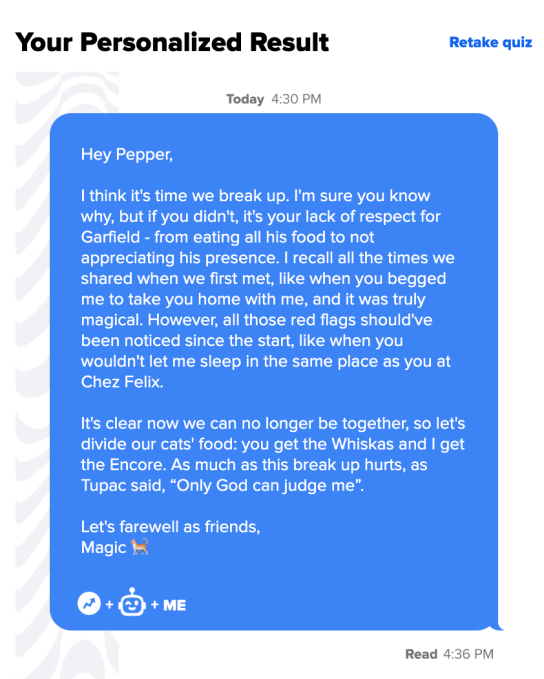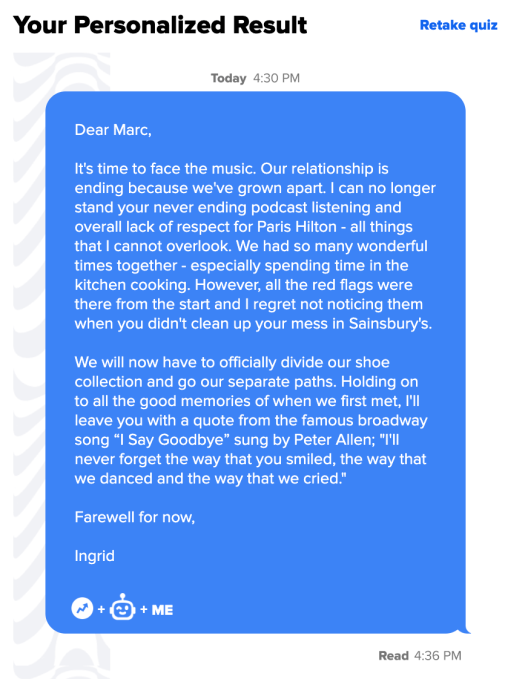BuzzFeed — the media site that made its name (literally) spinning out viral content — landed in the middle of the buzz itself last month when news leaked out that it would partner with the AI startup of the moment, OpenAI, to build a new AI-powered quiz format, building on the media company’s very popular quizzes that saw 1.1 billion views last year alone.
Now, that new product is launching: Infinity Quizzes, as it is called, will give users a basic theme, ask a few keyword questions and build a breezy, personalized narrative based on these. BuzzFeed said the quizzes are powered by an AI that it calls “Buzzy the Robot,” based on OpenAI’s publicly available API trained on a blend of text, code and information prior to June 2021.
The partnership is going live today with six quizzes, including four playing on Valentine’s Day, one sponsored by an advertiser, and one just for premium subscribers: “Create Your Own Rom-Com,” “Generate a Break-Up Text,” “Date Your Celebrity Crush,” “Find Your Soulmate (Hint: It’s a House Plant),” “Create Your Own Cinematic Universe For You and Your Friends” and “Create a Cult for You and Your Friends.” (Not sure how lighthearted everyone might find the last of these…)
If you’ve ever played Mad Libs or something like it, Infinity Quizzes are a lot like those, except the idea is that the stories that get produced from user responses on a theme are theoretically “infinite” in their variations, hence the name. But, similar to other generative AI services — be it OpenAI’s ChatGPT, Shutterstock’s image generators or something else — the results a little hit-and-miss. Personalization is there, but sometimes with awkward wording or cookie cutter results (see a couple of attempts I made at the bottom of this article).
BuzzFeed has been dabbling with AI since launching a picture generator in 2021, but all the same, when the OpenAI work was first revealed, it created a huge stir.
There are a lot of people skeptical that AI is a resoundingly positive development, some even downright alarmed at the thought — one big/obvious threat being that it could make humans and the role they play obsolete.
So BuzzFeed’s leap into the arms of a startup currently leading the charge on generative AI — which uses small cues from humans to build out elaborate narratives, music, images or other original content — to create content that would have previously been crafted solely by humans, felt like a signal for many: whatever dystopian future you think might be around the corner, it’s actually already here right now.
(It didn’t help that BuzzFeed announced just weeks before the OpenAI leak that it would lay off 12% of its workforce.)
Of course, not all responses were negative. BuzzFeed is listed on Nasdaq and it was in the doldrums before the OpenAI leak, with shares trading at less than a dollar each. The news sent the stock price skyrocketing, and while it’s now calmed down, it will be worth watching whether the impact of this deal was a flash or something that can be sustained by and for the business, or at least whether it can generate more investor enthusiasm — and, yes, buzz.
On that note, we’ve asked BuzzFeed questions about this news, including whether it can share any of the financial details of its partnership with OpenAI, and whether the latter will get a cut on sponsorship deals. None of those details are being disclosed right now.
Although the startup has really caught the eye of the world, and has pocketed a huge investment from Microsoft at a massive valuation, there are still big question marks over what will stick when it comes to building revenue and profit around its breakthroughs.
And, given that there have been some significant issues around the sources of the data that feed generative AI algorithms — the lawsuit between Getty and Stability AI highlighting just one of the problems — we have also asked about what happens to the data input into the Infinity Quizzes, including whether it is used anywhere else beyond the narratives.
BuzzFeed currently saves anonymized prompts and results from OpenAI to improve performance. OpenAI has data privacy and security policies in place to protect user data,” a spokesman said. It will also use the data to help inform what quizzes are subsequently built.
On the subject of cutting humans out of the equation completely, though, it sounds like BuzzFeed is not doing this — not at this point, at least. The company says that the quizzes and resulting stories are a collaborative effort between BuzzFeed’s quiz writers, “AI technology, henceforth dubbed ‘Buzzy The Robot,’ (official title: BuzzFeed’s AI Creative Assistant)” and quiz-takers themselves.
Right now there seems to be a lot of heavy lifting too — lots of testing and tweaking to make sure outcomes are fun and on point. That should come down over time.
“At BuzzFeed, the creative team’s approach to integrating AI is to build content that is “AI-native” or could not exist without artificial intelligence (such as an infinite number of instant, personalized quiz results); and things that are created by humans but *enhanced* by AI,” the company notes.


































Comment